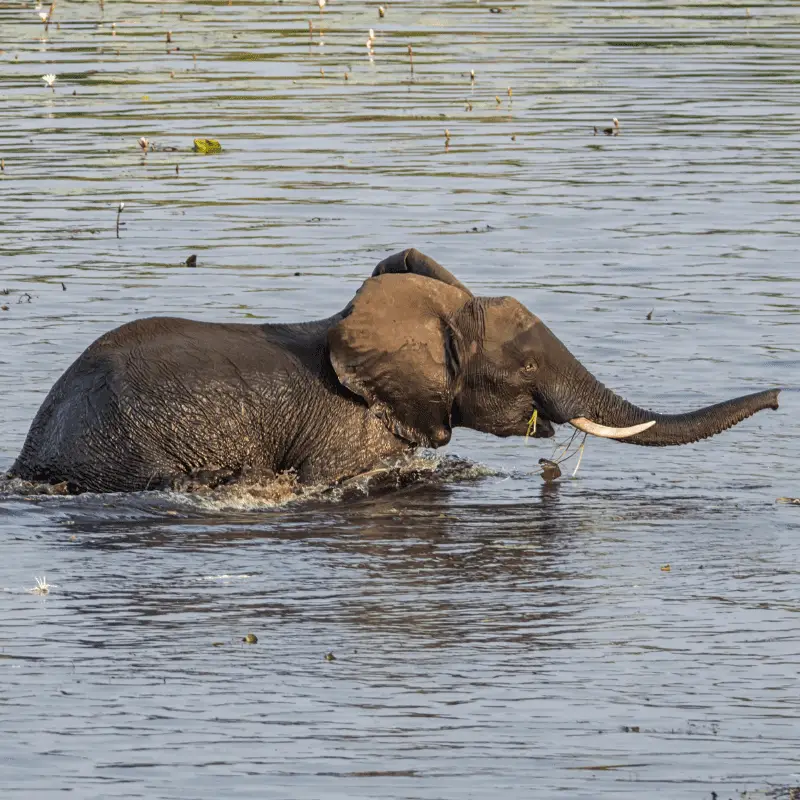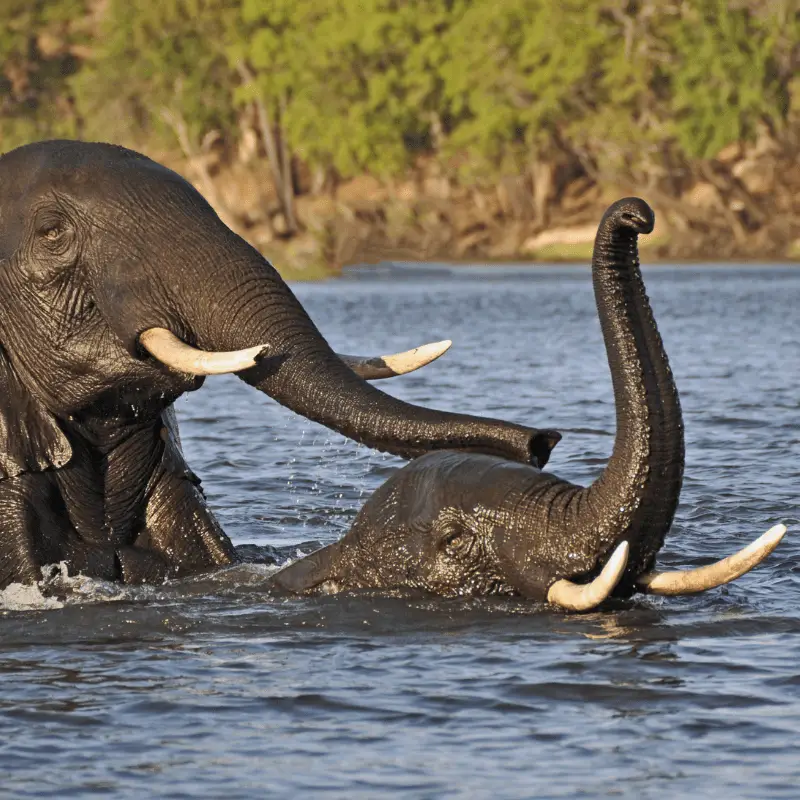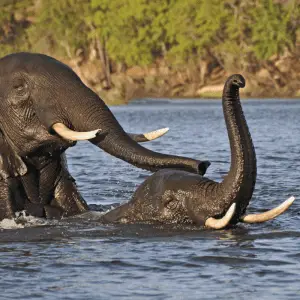If you love watching documentaries on animals as I do, you may have seen elephants playing with water in the wild. Even if you visit a safari park, you often find elephants excitedly playing with water. From that, one can easily assume that elephants love water.
Yes, elephants can swim, and they are excellent swimmers. Not only that, they can submerge themselves fully in the water. They use their powerful feet like paddles and their long trunks to breathe. The elephant’s strong leg muscles help them move against the friction of water.
Being the biggest mammal walking on the earth, elephants cannot jump like other mammals. However, they can swim without any trouble. Their massive body surprisingly gives them the buoyancy to float effortlessly in the water. While swimming, the trunk of the elephant offers them an advantage. Most elephants use their trunk just like a snorkel. This unique breathing device helps them to breathe while swimming. It also enables the elephants to swim for longer hours.
This may explain why elephants are so good at swimming: The elephants evolved from a common ancestor, an aquatic mammal, the Manatee. Manatees look like walruses or chunky porpoises. They are also known as sea cows.
Are elephants related to manatees?
Yes, elephants and manatees are related. They both belong to the order Sirenia, which includes aquatic mammals such as dugongs and manatees.
Common Ancestor Group Of An Elephant
The common group ancestor of an elephant is the Proboscidea, an extinct group of mammals that lived during the Eocene epoch.

Elephants are strong swimmers because:
Trunk
Elephants are one of the most intelligent mammals in the world. They use their trunk as snorkelling tubes while swimming. That gives them a unique advantage as the elephants can breathe while swimming. They can keep on swimming for hours and hours. Experts have pointed out that an elephant can swim without touching the ground for nearly six hours. An elephant can cover a distance of about 30 km while swimming at a speed of 2.1 km per hour.
Feet
Along with their trunks, elephants use their feet as strong paddles while swimming. Other than that, the elephants’ small, muscular body muscle enables them to drag themselves against the heavy current of the water. However, the massive body of the elephants could have created obstacles if these animals were not extremely smart. They use their bodies extremely smartly while swimming in various situations.
Long-distance Swimmers
Elephants may be heavy-set, but their bodies do not become obstacles in the water. While talking about the elephants’ swimming abilities, we should not forget that these animals can walk about 80 miles daily for food and water. That means their legs are powerful and muscular. That helps them swim for hours against the strong current of water.
Another factor that makes long-distance elephants excellent swimmers is that they do not tire quickly. But if they get tired while swimming, they rest for some time. Their massive bodies give these animals a unique buoyancy that does not let them drown like dead weights.
African elephants can swim more than 48 kilometres across the water. They can also swim for six hours continuously.
Today, elephants living in Sri Lanka are the progeny of the animals that swam across the sea from southern India.
The only constraint against these long-distance swimmers is the need for food and water during the journey.
Why Do The Elephants Swim?
One of the biggest questions that may pop up in your mind while thinking about elephants’ swimming abilities is why they need to swim first. Some people may believe that elephants swim to get better food and water. But that is not always the case. Sometimes elephants jump into the water to reduce their body temperature.
Elephants are native to Asian forests and African savannas, with very high temperatures. Water plays a vital role in these animals’ lives. Without access to water during the summer, these animals can die quickly. Of course, they do not have much choice but jump into the water to cool down their body temperature during extreme heat.
Migration is yet another reason why elephants tend to swim. They often swim long distances to move from one place to another in search of food.
If they find river lakes or other water bodies blocking their journey, they swim across them without changing their path.
Visit here to see some fantastic videos of elephants swimming.
Swimming Abilities And Evolution
Ancestors of modern-day elephants were semi-aquatic. These animals are considered smaller than the Hippopotamus of today, but they lead similar lives. Dugongs and manatees are also long-distance cousins of elephants, and both are aquatic animals. Having these types of marine animals as ancestors has given the elephants this unique swimming ability, making them one of the best mammal swimmers in the world.
Baby Elephants

Even though swimming is their nature, elephants require time to learn it. Baby elephants can swim immediately after their birth. Before the babies swim, they stay in the water by their mother’s side, generally playing and getting used to it.
The baby elephants do not know how to use their trunks for drinking water. That’s why you can see many baby elephants bend their heads while drinking water. They learn how to use their trunks and manage themselves underwater as they grow up.
Staying Submerged Underwater
Another impressive thing that elephants can do is stay submerged in water for a long time. While swimming underwater, they only keep their trunk above the water’s surface, just like the binoculars of a submarine. It helps them get a constant supply of fresh oxygen from the environment.
Can Elephants Drown?
It’s scarce for a healthy elephant to drown. Even though elephants are long-distance swimmers, the question of drowning gets raised pretty often. As mentioned earlier, elephants do not tire quickly while swimming underwater. But when tired, they stop swimming and float in the water to rest. The broad surface area of their body gives them the buoyancy required to stay afloat. That means it is not easy for an elephant to drown.
Can Elephants swim in the ocean?
Of course, elephants can swim in the open sea. However, most of the time, elephants take this step in extreme emergencies. These intelligent animals know that dangerous predators, like sharks, live in seawater. So they try to avoid going into the open sea as much as possible.







